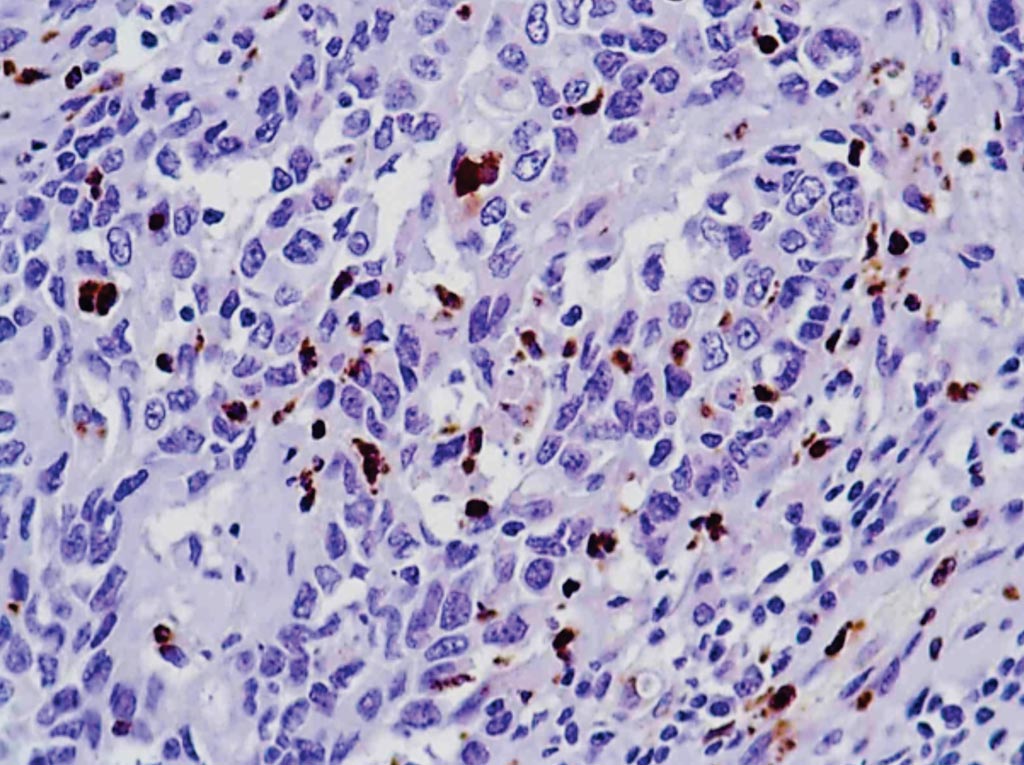Biomarkers Predict Prognosis in Alcohol-Related Cancer Patients
By LabMedica International staff writers
Posted on 26 Jan 2018
Alcohol consumption has been identified as a modifiable risk factor for cancers such as gastric cancer. Alcohol consumption likely induces gastric carcinogenesis through deregulation of ribonucleic acid polymerase III (POLR3) III and oxidative damage.Posted on 26 Jan 2018
A new report sheds light on how specific proteins interact with alcohol, and how that interplay impacts survival and response to platinum-based adjuvant chemotherapy in patients with gastric cancer who may or may not still be drinking.

Image: Human stomach adenocarcinoma stained with anti-myeloperoxidase (MPO) antibody (Photo courtesy of Roche Life Science).
Scientists at Anhui Medical University (Hefei, China) analyzed tumor tissue from 77 patients who had undergone surgery for primary gastric adenocarcinoma and 69 tissue samples taken from outside the tumor area. Among them, 66 patients received radical surgery and 57 patients received platinum-based adjuvant chemotherapy. All 77 patients were followed for an average of 18 months, during which time 94% (62/66) experienced disease recurrence. Patients remained free of disease for an average of 14 months (disease free survival, DFS) whereas the median overall survival (OS) was 20 months.
The team found that transcription factor IIB-related factor 1(BRF1), breast cancer susceptibility gene 1/2 (BRCA1/2), and myeloperoxidase (MPO) were also helpful in predicting which patients would benefit more from platinum-based adjuvant chemotherapy. For example, DFS was extended two-fold or more in patients who underwent chemotherapy and showed negative or low BRCA1/2 expression. For those with negative or low BRCA1, the average disease-free interval was 18 months compared to nine months in the high-expression group. Patients with negative MPO also had a better outcome trend, although it was not statistically significant.
The investigators found that alcohol continued to have a detrimental effect in patients. High BRF1 expression and MPO-positive inflammatory cell infiltration were more frequent in gastric cancer patients with hazardous or harmful alcohol consumption habits. Abnormal changes in BRCA1 in tissues outside the tumors were more frequent in alcohol abusers. In previous studies, these investigators found similar correlations between BRF1 and alcohol consumption in breast and liver cancer patients.
Hua Wang, MD, PhD, the co-senior author of the study, said, “Alcohol consumption is a known risk factor for gastric cancer, which carries high morbidity and mortality in China. We found that DNA repair-related markers, BRF1, BRCA1/2, and MPO. have good prognostic value in gastric cancer patients with or without harmful alcohol consumption habits. Moreover, these proteins are also associated with how effective platinum-based adjuvant chemotherapy will be for gastric cancer patients.” The study was published on January 10, 2018, in The American Journal of Pathology.
Related Links:
Anhui Medical University














